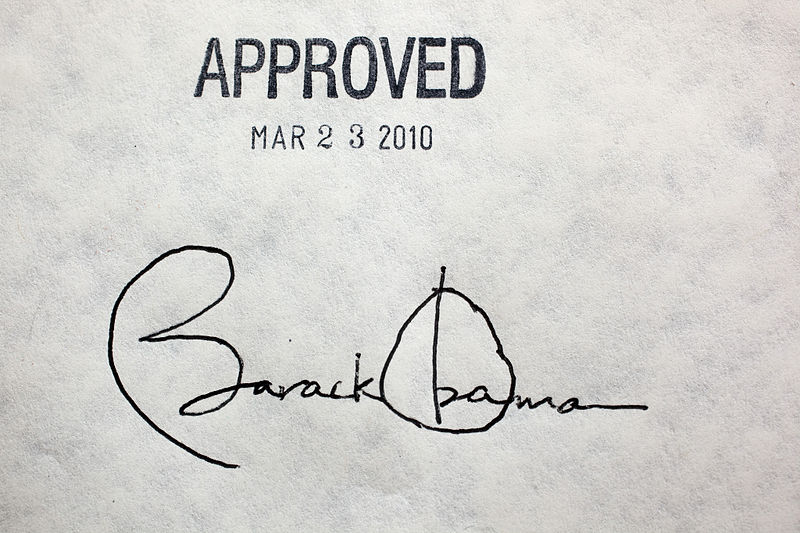Rising premiums, increased taxes, mountains of regulations, religious freedoms curbed, expensive subsidies, loss of coverage, employer job losses, and doctors planning on retiring are just a few of the unexpected (to the uniformed) consequences of Obamacare. Is any thinking person surprised the bill of goods being sold by Obama and the Democrats was false? The Wall Street Journal points out the obvious with a few economics 101 statements.
…the law will block insurers from refusing to sell coverage or setting premiums based on people’s health histories, and will reduce their ability to set rates based on age. That can raise coverage prices for younger, healthier consumers, while reining them in for older, sicker ones. The rules can also affect small businesses, which sometimes pay premiums tied to employees’ health status and claims history.
It also cited the law’s requirements that health status not affect rates and that plans include certain minimum benefits and limits to out-of-pocket charges, among other things.
A risk mitigation product no longer able to base the cost upon risk mitigation. How could people not know this would raise the cost of insurance? Required maternity coverage for all women even if they have zero chance of becoming pregnant? Add to that the fact that insurers are not allowed to charge different rated based upon different conditions applying to men versus women? How could rates not go up as a whole when 80 year old grannies are required to have maternity coverage?
The CBO and many sources like to point out the “subsidy” aspect of the law. This can lower the cost of insurance to those earing up to $94,000 per year. It is important to understand that a “subsidy” is the taking of money from one person and giving it to another via the government. There is not real reduction on the whole. Just another reallocation of other people’s money.
Subsidies will be available on a sliding scale for people with incomes of up to four times the federal poverty level—currently $45,960 for a single person and $94,200 a year for a family of four. More than half of the 35 million people expected to be in the individual market by 2016 are likely to qualify for credits. People whose incomes are around the poverty level could see almost all of the cost of their insurance subsidized, while people at the upper end will get only a small discount toward their premiums.
Yes, that is correct. The taxpayers will be funding the insurance of at least 17 million people. This bill was supposed to stop the cost of the uninsured from being borne by the insured. This law just codified that cost. But the numbers are even worse according to the CBO, as the Weekly Standards reports.
The CBO also says that — despite its colossal cost and its unprecedented expansion of power and control over Americans’ lives — Obamacare would, as of a decade from now, leave 30 million people uninsured.
Even if one were to assume that Obamacare’s annual costs, which the CBO says would rise by between 3.6 and 9.5 percent during each of the final five years of its scoring, would suddenly stop rising altogether in 2023 and would remain at $256 billion — the cost for 2022 — the tally for Obamacare’s real first decade (2014-23) would be $1.930 trillion.
Really, it would be much higher. That’s because this tally, as the CBO notes, merely reflects the cost of Obamacare’s “insurance coverage provisions,” not the cost of Obamacare as a whole. Based on previous CBO estimates, Obamacare’s overall 10-year costs would likely eclipse $2.5 trillion. This would be alarming enough without taking into account this additional consideration: Experience strongly suggests that the CBO is underestimating, rather than overestimating, the cost of this huge expansion of federal power.
This bill was never about health coverage or controlling costs. It was about power, control and the desire to have single payer government run healthcare. The fines to employers are designed as an incentive to push people into the exchanges. If they wanted employers to provide coverage, the FINES MUST BE HIGHER THAN THE COST OF COVERAGE. The projection by the CBO of fines being much higher ought to be a red flag to any thinking person. They indicate the scope of coverage that will be dropped.
At the same time, employers with large, low-wage workforces may find it financially advantageous to withdraw health coverage, even if they have to pay penalties. The CBO expects penalties to total $130 billion over the next decade, up $13 billion from its previous forecast.
The exchange programs for the States are designed to force them into the program. States (and their citizens) that do not join the exchange will be subsidizing those States that are in the exchange. If this bill was about better coverage, it is a complete failure and example of incompetence by Obama and the DEMs. It is about transition to single payer government run healthcare.
Remember Obama hammering home that if you like your insurance, you will be able to keep it. Not so, according to the CBO.
Those who lose that coverage won’t all be joining the ranks of the uninsured or the unemployed, though. Many are expected to shift into the health insurance exchanges being set up under the Affordable Care Act. The number of people participating in those exchanges is projected to grow from 7 million in 2014 — the first year they’ll be available — to 24 million in 2016.
Now that the bill has passed, we are finding out what it in it. It’s not pretty.
Links referenced in this article:
Health Insurers Warn on Premiums
Morning Bell: Thanks to Obamacare…
Fewer people will have employer health insurance, CBO projects
CBO: Obamacare to Cost $1.930 Trillion, Leave 30 Million Uninsured

